- Home
- Micheal Maxwell
Helix of Cole Page 7
Helix of Cole Read online
Page 7
Jason, yes, Jason, he had been there. His mind raced back to hearing Mel Lyman speak. He remembered selling the Avatar on the streets of Boston. A memory came that Jason didn’t like; he tried to suppress it, but it floated back to the surface. Stealing, no, it was someone else. Stealing, accused, and told to leave. He remembered Mel’s eyes. Mel knew of Jason’s actions without speaking, accusing, or judging. Most of all, Jason remembered the Karma Squad and the beating they’d given him the night he tried to sneak back into the house to talk to Mel. God, how he wished he could give the money back. Oh, to just sit at Mel’s feet and listen again. He had forgotten so much. He sometimes thought that he mixed the voices. He read so much, he listened to so many. Was he losing Mel? Never. The voice of God could not be lost.
Who wrote this? Under the headline was the name Cole Sage. Where are you now, mister newspaper writer? He must take it back. No, Jason thought, he will be the one. He would tell the new story. The revolution reborn must be announced. “Jason Reed, Hero of the New Revolution.” He could almost see the headline in his mind. Savior of Our Mother the Earth! Cole Sage would be the new Oracle of the Revolution. He would repent and make straight what he defiled.
“I will find him tomorrow.” Jason spoke the words as a vow, closing and padlocking the footlocker.
When Jason awoke, the sun was high in the sky. He felt his hair, and it was wet with sweat. A shaft of light came through the shade on the window, and he could see that the Indian was gone. Jason stood and made his way out of the tack room to the faucet that hung above a cement sink in the corner of the barn. He washed from the waist up in the cool water, letting it pour gently over his raw, sunburned shoulders. The T-shirt he grabbed from the tent was rank with Kyle’s body odor, and he threw it into the corner of the barn on his way out.
In the truck, he fished out a clean T-shirt from the travel bag that belonged to one of the dead campers. Without a word to anyone, he drove out of the ranch and back to the main road. Forty-five minutes later, he exited the Santa Monica Freeway. This was a necessary trip, but he hated to go into the southwest end of Los Angeles. He needed a phone, and he had to get rid of the truck. As he drove, he watched groups of black and Hispanic youths that gathered along the streets.
The street gangs of L.A. sliced up the city and controlled with blood and fear the turf they claimed. Jason hated them. They served no purpose in society. They killed and terrorized their own people. They were leeches and would be eliminated after the revolution by the people who loved the earth. Peace would reign after the bloodletting and the punks who stole for their own gain and killed for a few blocks of slums would have no place in his world. For now, though, he would use them to his purpose.
The directions Jason received were not good. The phone at the Shell station where he got gas was in poor repair, and the slurred black ghetto slang was hard to decipher. He was sure he was on the right street, but the landmarks were different than the guy on the phone described. The stuff on the right side of the street was actually on the left. The KFC was a Popeye’s, and he never did see the Taco Bell. Luckily, the guy got the streets right. Jason wasn’t here sightseeing, and the sooner he got his business done, the sooner he could be on the road.
The light changed. Jason was the second car in the right lane. Ahead about a half block, he saw a kid about 16 talking on a cell phone turn into an alley. On the other side of the alley, a small grey car pulled away from the curb. As the light went to green, Jason signaled and slid into the now empty spot. Passing the alley, he saw the kid leaning against the wall next to a dumpster with his back to the street. He got out of the truck and quickly ducked into the alley. The street noise covered the sound of his approaching footsteps. About three feet from the kid, Jason spoke.
“Excuse me.”
The kid leaning against the wall turned his head, giving Jason a sneering, disgusted look as though he were the filthiest of beggars and turned back around.
“Excuse me,” Jason said again.
The kid turned his head again and as he opened his mouth to speak, Jason, throwing his whole body behind it, landed a crushing blow to the kid’s jaw. A dull thud resounded as the blow sent him slamming against the dumpster. Jason stepped forward and grabbed the kid’s neck with his left hand and wrenched hard with his right, which was gripping the side of the kid’s head. In that one swift movement, the kid’s neck snapped, and he fell dead. His cell phone clicked closed as it hit the ground. With a confident flow of movement, Jason grabbed the front of the kid’s Lakers T-shirt and the top of his baggy jeans, lifted the limp body and dropped it into the dumpster. He closed the lid and slid the bolt closed.
Stooping, Jason picked up the phone and looked back to the street. He began pushing the dumpster to the end of the short alley where three more dumpsters were squeezed together in a chain link enclosure. He pulled out an empty one and pushed it to the spot the other one was. He knew this kind of dumpster setup from when he washed dishes in the kitchen of a Chinese restaurant; they were on a monthly pickup rotation. Without missing a step, he continued on to the truck and drove away.
Six blocks and two left turns put him in front of Joe’s Mexico City Café. There was the noisy clang of a cowbell above the door that announced his entrance. Inside the restaurant, it was cool but damp. Somewhere a swamp cooler was working overtime to combat the steam heat of the kitchen. A chunky Mexican woman in a skintight black skirt led Jason to a rear booth. As he requested, he was next to the windows.
Every square inch of wall space was covered with an astounding mishmash of bric-a-brac. Hundreds of little shelves and hangers displayed dozens of plates all decorated with saints, Jesus, and scenes from Mexico. Next to a scene of the Crucifixion was a plate with two fighting cocks suspended in air. Jason sipped water as he waited for his contact and slowly and carefully examined the walls. The gold and white French provincial shelves about a foot wide held fancy cups, statues of saints, soccer trophies, roosters, bulls, matadors, and figurines of Jesus with lambs and little children, standing arms spread wide, and one with a clock and an oversized heart in the middle of His chest.
The cowbell clanged, and a Mexican man of about 20 in khaki Dickies work trousers and a white T-shirt came through the door. It was well after the lunch rush, and Jason was one of only three customers in the place. The man surveyed the counter and instantly determined the two old men were not who he was looking for. He turned his gaze on Jason and came to the booth. He slid in, set a cell phone on the table, and pushed his sunglasses back onto the top of his head.
“Artie says he don’t know no Jason Reed. What’s your game?” the Mexican said slowly.
“Is that to call him?” Jason said, indicating the phone.
“Yeah.”
“Okay, tell him to check on Curtis Winger with Hernandez.”
The young man picked up the cell and flicked it open like a switchblade, hit a button, and put it to his ear. “It’s Domingo, ask Chewy if he knows a Curtis Winger.” The young man looked up at Jason and smiled. “Is that so? Aw right, see you in a few.” He flicked the phone closed and the smile disappeared. “He says you’re crazy and for me to be careful. You crazy, man?”
“Crazy enough, I guess. So, are we going to do this or sit here and play 20 questions?” Jason stared into the young man’s eyes and could have sworn he saw him shudder.
“Your ride is on the curb? The Ford?”
“Yeah.”
The young Mexican dug into his pants pocket and pulled out a pair of keys on a yellow “Have a Nice Day” key ring. “The blue Kia parked behind you. Your change is in the glove box.” He slid the keys across the table at Jason.
“Here.” Jason held out the keys to the truck and dropped them in Domingo’s waiting hand.
The young man slid out of the booth and was out the door and in the truck before Jason could stand up and drop a tip on the table. If you looked close, the late model Kia had obviously been painted, but traveling down the road, no one would be
able to tell. A good trade, Jason thought. Behind the wheel, he leaned over and popped open the glove box. Inside was a brown paper bag wrapped tightly around what looked like a small brick. Jason tore the tape free and unrolled the bag. As he requested, there was $5,000 in $10 bills. A fair trade, he thought. A car and five grand for a free truck.
On his way back to the ranch, Jason stopped at a mini-mart and bought a bottle of vodka and a sandwich. The Kia ran well, and Hernandez filled the tank with gas. The license plates had fresh tags, and there was even a dummy registration in a plastic holder on the visor in the name of Curtis Winger.
* * * * *
Cole was deep in thought when his phone rang.
“We’re all here, where are you?”
“Oh, Chuck. Man, I was reworking this piece, and the time got away from me. I’m there, hold on.” Cole looked at his watch. He was seven minutes late for the editorial meeting. He pulled his jacket off the back of his chair and raced out the door.
It took him only seconds to get down the hall to the conference room. He opened the door, and eight pairs of eyes all landed on him with “now it’s your turn” looks of pure glee in their eyes. Chuck Waddell sat at the end of the long walnut table in his tall back swivel chair. He always pushed it in from his office for meetings.
“Mr. Sage, so glad you finished your nap,” Chuck teased.
“Sorry.” Cole looked down in totally faked contrition.
Cole sat toward the center of the table next to Hillary Willard. Hillary was one of the first to welcome Cole to the Chronicle, and even though she was the Social Editor, they hit it off and were becoming good friends. Hillary held the distinction of being one of the two women who played in the Thursday night poker games.
“I hope this is short,” Hillary whispered as Cole sat down.
“Lot to cover today, people. Eric?” Chuck always started around the table from right to left. The About Town columnist, Eric, always visited with Chuck before the meetings started and was always the first to report.
Cole had at least 20 minutes before it was his turn. He was back to his rewrite in his head and a thousand miles away when he heard Hillary start to speak. He sat up and tried to refocus.
“And that’s about it for this week,” Hillary finished.
“Cole?”
“I’m trying to wrap this series on the faith-based charities in the city. I should have the last rewrite finished by tomorrow. I’ve got a couple ideas, but nothing has jelled. Three interviews have canceled, so it’s back to the drawing board. Luckily, I’m a couple of days ahead of schedule on this stuff.” Cole lifted a two-inch thick manila folder of tear sheets and notes. “Soon the muse will land. Never fear.”
Chuck reviewed the month’s calendar, and the meeting broke up in record time. Cole couldn’t help thinking of his old friend and editor, Mick Brennan, in Chicago. Their editorial meetings would last so long, they would send out for lunch and sometimes dinner. In retrospect, Cole thought that the people on the paper were like Mick’s family, and once he everyone was in the room, his loneliness wouldn’t let them go. So, like the father of an unruly family, he would keep the conversation and activity going as long as he could at the “dinner table.” Bless his heart, Cole thought, I miss the old bugger.
“Hey, want to grab a bite?” Hillary Willard asked, tugging on Cole’s sleeve.
“Can’t. I really have to finish this piece. It’s really giving me fits. You’ve lived here forever. You ever go to Glide Memorial in the late ’60s, early ’70s? Back when Cecil Williams was really stirring things up?”
“Cole, sweetheart, have I ever given you one of my cards?”
“I don’t think so.” Cole wasn’t sure where this was going.
“Here, read.” Hillary handed Cole her card.
“Hillary Willard, Society and Social Editor, San Francisco Chronicle,” he read.
“Exactly, Society Editor. Now, does that sound like someone who would go down to Ellis and Taylor and bump butts on a pew with a bunch of junkies and God knows who else?”
“Meow! Forget I asked.” Cole made a clawing motion in the air.
“I’m teasing. Cecil and I were on a board together a few years ago. Homeless shelter sort of thing. He’s a wonderful man. You’d get along well with him. Go see him. Tell him I said ‘hello.’”
“I was thinking about doing just that. I need a punch line for the ending. Can I get a rain check on lunch?”
“Rain checks only granted if you buy.” Hillary gave Cole a big grin.
“You’re on.”
An hour later, Cole parked around the corner from Glide Memorial United Methodist Church. Since coming to San Francisco, Cole tried to avoid the Tenderloin. Probably the toughest area of the city, the ravages of drugs, alcohol, and poverty left deep scars. If the Tenderloin had a heart, it was Glide. The church was built in the late ’20s, and over the years ebbed and flowed with the times. Membership hit its lowest level in the early ’60s, and shortly after, Cecil Williams came onboard.
Williams had a mission. That mission was to reach the disenfranchised of the city. Addicts, gays, alcoholics, the homeless people whom traditional churches either turned their backs on or had no clue how to help. Glide was the haven of unconditional love in a world of sorrow and rejection in one of the city’s roughest neighborhoods. Within a few years, Glide became a beacon of light to people lost in darkness. Today, 30-some years later, the social programs of Glide were world-renowned. The food program alone put government social programs to shame; serving more than a million meals a year, Glide gave a helping hand to those who, without it, would perish. AIDS testing, health care, women’s programs, crisis intervention, literacy, computer training, jobs training and placement, and children, youth, and family educational programs—just the beginning of how Glide served the community.
As Cole approached the front doors of the church, a tall thin man in a pair of baggy shorts, a tie-dyed Hello Kitty T-shirt and a big smile greeted him with a warm “hello”.
“Hi, how’s it goin’?”
“One day at a time!” The man beamed. “Hope you aren’t wanting to see anybody.”
“I was hoping,” said Cole.
“They’re all at a retreat.”
“A what?”
“Retreat. All the staff goes a couple times a year to have a day of recharging their batteries. Lotta food, prayer, and just kind of kickin’ back, all together, all at once.”
“Sounds like a good idea.” Cole liked this man’s energy; it seemed almost infectious. “So, how is it you got stuck here?”
“Oh I’m not staff, just a volunteer.” The tall man put out his hand to Cole and said, “Paul Moore.”
“Cole Sage, I’m with the Chronicle.”
“Doin’ a story on Glide?”
“Sort of. I’m working on a piece about faith-based charities.
Glide is high on my list of examples,” Cole answered.
“Sure saved me,” Paul said, looking down almost shyly.
“How’s that?” Cole asked.
“If it hadn’t been for Glide, I would have been dead long ago.” Paul looked deep into Cole’s eyes for a long moment.
Paul Moore’s deep blue eyes seemed to project an inner peace. His face was tan and deeply lined. It wasn’t the lines of a hard life; more the lines of a life lived outdoors and smiling. Cole knew with a little prodding that there was a story worth hearing behind those eyes, and he sensed it would all come back to Glide.
“Paul, can I ask you a few questions for this article?”
“I guess, long as you spell my name right,” Paul said with a laugh.
“Two ‘o’s?” Cole smiled back. “How long have you been coming to Glide?”
“April 7, 1972. Next.”
“What time?” Cole smiled broadly. “Just kidding. Paul, I have a feeling you have a good story. Want to tell me, instead of me asking a bunch of silly questions?”
“Morning service, 11:00.” Paul laughed at h
is own wit. “It’s a long story. Want to sit down? I have a couple of Cokes in my ice chest over there.”
“That would be great. Where shall we sit?”
“The steps are where it all started, how ’bout over there?” Paul pointed.
Paul went to the small blue ice chest next to the building, got two Cokes and a sandwich wrapped in plastic wrap.
“Might as well have lunch while we’re at it. Turkey and alfalfa sprouts. Want half?”
“Sure.”
The two men climbed the steps just high enough to be out of the sun and sat down. Paul unwrapped the sandwich and handed Cole half.
“So, what do you do when you aren’t volunteering, Paul?”
“Well, I was an electrician, but I fell off a ladder and now I’m disabled. $686 a month.” Paul took a big bite of sandwich. “These are my specialty. Turkey, alfalfa sprouts, and peanut butter. Never acquired a taste for mayonnaise.”
“It’s good.”
“Better when I got bacon to put in it, but the price of bacon lately, forget it.”
The two men sat in silence as a bent old woman passed in front of them pushing a shopping cart stacked high with her earthly possessions, tied down under a blue ragged-edged piece of tarp.
“I always wonder if I would have made it that long,” Paul said, wiping his mouth with the back of his hand.
“There but for the grace of God?” Cole prompted.
“I was in the Red Freedom Brigade. Ever heard of it?”
“No.”

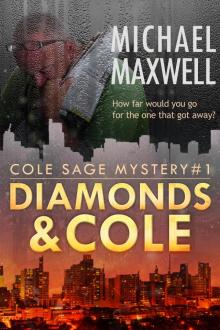 Diamonds and Cole: Cole Sage Mystery #1
Diamonds and Cole: Cole Sage Mystery #1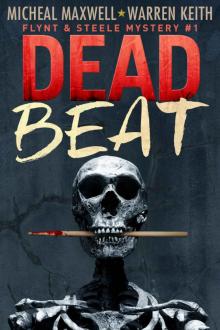 Dead Beat
Dead Beat![[Cole Sage 03.0] Helix of Cole Read online](http://i1.bookreadfree.com/28/cole_sage_03_0_helix_of_cole_preview.jpg) [Cole Sage 03.0] Helix of Cole
[Cole Sage 03.0] Helix of Cole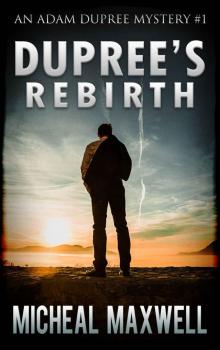 Dupree's Rebirth
Dupree's Rebirth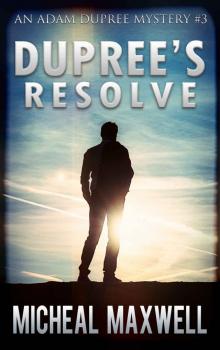 Dupree's Resolve
Dupree's Resolve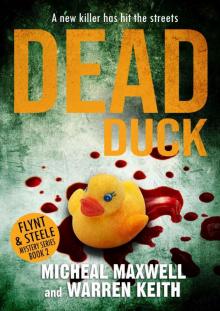 Dead Duck
Dead Duck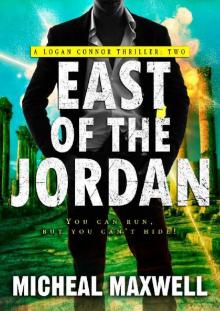 East of the Jordan (A Logan Connor Thriller Book 2)
East of the Jordan (A Logan Connor Thriller Book 2)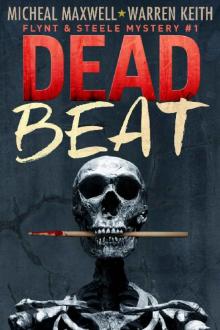 Dead Beat (Flynt and Steele Mystery Book 1)
Dead Beat (Flynt and Steele Mystery Book 1)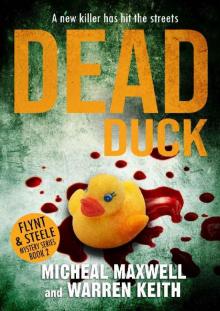 Dead Duck (Flynt & Steele Mysteries Book 2)
Dead Duck (Flynt & Steele Mysteries Book 2)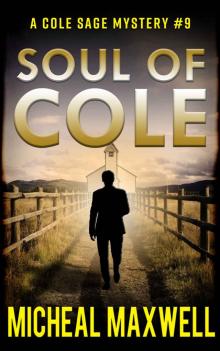 Soul of Cole
Soul of Cole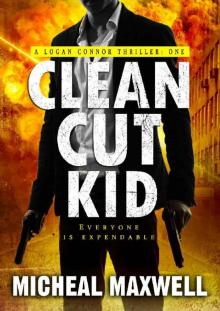 Clean Cut Kid (A Logan Connor Thriller Book 1)
Clean Cut Kid (A Logan Connor Thriller Book 1)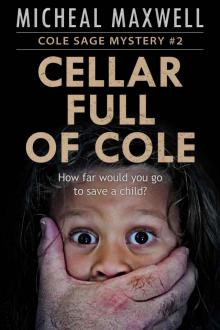 Cellar Full of Cole: A Cole Sage Mystery #2
Cellar Full of Cole: A Cole Sage Mystery #2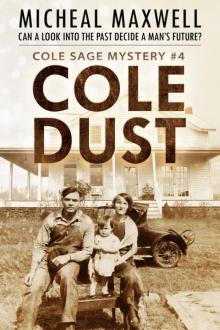 Cole Dust Cole
Cole Dust Cole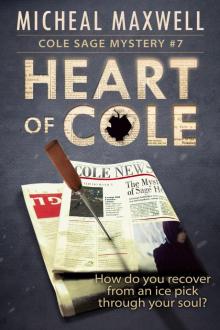 Heart of Cole
Heart of Cole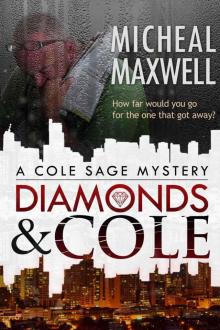 Diamonds and Cole: A Cole Sage Mystery
Diamonds and Cole: A Cole Sage Mystery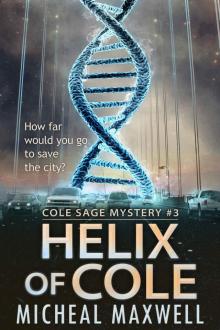 Helix of Cole
Helix of Cole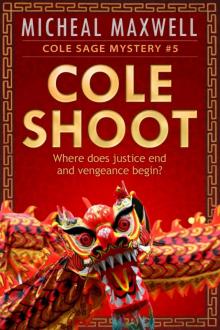 Cole Shoot
Cole Shoot